News
Gastronomika is consolidated as "the chefs' congress" at the best event in its 25-year history
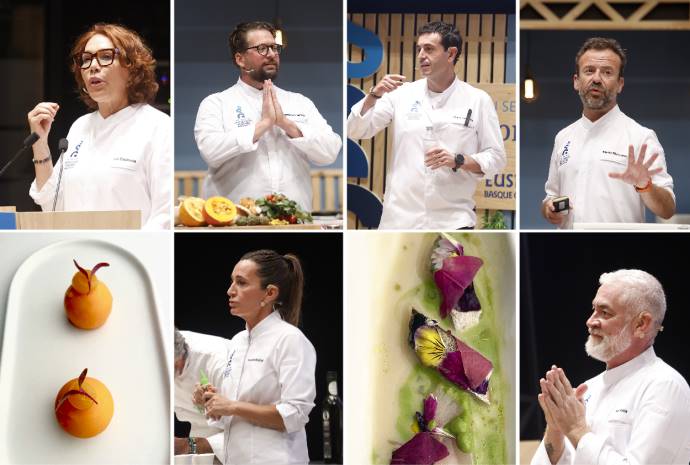
San Sebastián Gastronomika-Euskadi Basque Country closed down its best congress yet in 25 years, not so much in view of the record attendance or the quality of the programme and the chefs involved, but most of all for the positive attitude over the three days. An emotional and very special event signifying a return to the foundational spirit, the spirit of the chefs' congress, where everyone wants to be and get involved.
But not only that - it also demonstrated that it means to go on being the future of gastronomy, in addition to all that has been achieved. The oldest of culinary congresses has celebrated its twenty-fifth birthday among the main actors in its story, which is also the history of Spain's gastronomy revolution.
The congress data bear out the record-beating sensation, with 14,712 accreditations, 48 nationalities, 1,468 congress-goers and 413 journalists. More than 10,000 items were sampled in the auditorium, and 160 companies operated exhibition stands at the Kursaal. In the opinion of Benjamín Lana, the new director of Gastronomika, taking over from Roser Torras, as of today, "this event has been a success not only in terms of the number of people, and the people who attended. It has also been a success in terms of the atmosphere here, almost a reunion, and almost a refounding of the cuisine revolution in Spain, which began at Gastronomika. It has been attended by all those who were important at the time, those who are important now, and some of those who will be some day. It was like a kind of generational encounter too, and we could say that it was one of the most important events in gastronomic history. Gastronomika has been given a boost for whatever lies ahead, and it can still call itself one of the sector's major global events".
San Sebastian Gastronomika-Euskadi Basque Country 2023 has been a journey through different types of cooking from all over the world, protecting the surroundings and local produce, but it has also taken a look at some trajectories running alongside the congress itself, relevant to many of the talks staged in an auditorium recalling the good old days.
Emotion, improvisation and social commitment, the keynotes of today's talks
Ricard Camarena and Alex Atala put the finishing touch to the 25th San Sebastián Gastronomika with a creative Jam Session of local produce. With the challenge of "not sticking to any script, and with no expectations other than enjoying the experience of being among friends and having fun all the while", they went to Donostia's La Brecha market yesterday to stock up with the best ingredients to produce "a festive Basque Country banquet", which received an ovation from congress-goers at the Kursaal.
And if the Camarena-Atala twosome finished off the congress, today's session kicked off with US chef Matthew Lightner, who runs Okta, a restaurant located in the valleys of Oregon, where he combines creativity with biology and climate activism. “We had to become nature freaks to find out everything that was biologically available”. In this regard, the chef described his process as the basis of the emotional idea of a recipe, although this is followed up immediately by the organoleptic concept of the ingredients. “This combination makes up the narrative for each creation, which includes the stories of which it is composed, and also our intentions in the composition of the different flavours and textures", he explained.
This global vision of the gastronomic experience as something emotional was shared by Murcia chef Juan Guillamón (AlmaMater), who remarked that "a chef doesn't feed diners, a chef creates emotion in diners”. At Gastronomika, Guillamón explained that AlmaMater focuses on arousing the emotion of taste in diners, inserting nuances and counterpoints to encourage them to go on, with no saturation of the palate, right through a 12-section menu. This concept is based on the idea that "pleasure is not linear, and is more an appreciation of different types of pleasures. That is what we are looking for with our creations, to arouse the palate, and the other senses, so that we can feel pleasure in our brain".
One of the nuances, acidity, was the subject of the talk by Begoña Rodrigo (La Salita*), who is still involved with her culinary experiments in this regard, and she demonstrated a few of its applications. The lady from Valencia also took the opportunity to say that gastronomy conferences are the place to "talk about the things we need to know in order to continue", especially in a world now dominated by immediacy. We all want something right now, and there are many people who don't understand the trade, because they aren't experiencing it". In this regard, "it's us", the chefs, "who have to adapt to these new times”.
Gastronomika was a topic for Nacho Manzano (Casa Marcial**), who wanted to demonstrate his gratitude to the congress, because "I owe a very high percentage of what I am to Gastronomika”. In this regard, the Asturias chef praised the rural environment, origins, and spoon cuisine with an extensive present and a promising future.
The chef from Asturias wanted to demonstrate his gratitude to the event, because "I owe a very high percentage of what I am to this congress. It's unique”, because here "magic things happen, incredible things".
Another major talk came from Leo Espinosa, and the Colombian chef touched on the main aspects of her Funleo foundation, and underlined the importance of passion over technique. Espinosa wanted to send a message to the youngest chefs, and the message was "technique should never take precedence over soul" because that, not technique, is the real raison d'être of cookery. What prevails in my culinary range is that deep connection with culture and gastronomic tradition", she concluded.
With the title 'Spanish produce in Japan and the United States as a bridge between cultures’, there was also time for debate at a round table, where four chefs running Spanish restaurants in other countries singled out the importance of quality produce as the ambassador of a culture and its gastronomy.
Grill and oil, the day's competition
The competitions continued on the third and last day of the event, with the fourteenth legendary National Grill Competition. in which grill man Mohamed el Hamdy, from La Tropical restaurant (Los Alcázares, Murcia), took the prize alongside the Trasacar meat.
The other winner at the congress was Juan José Mesa León, from the Radis restaurant (Jaén), whose recipe ‘Bread, oil and chocolate’ took the International Cuisine Award, “Jaén, Paraíso Interior”.
Three days have gone past, with much emotion and memories, strewn with anecdotes and experiences, and with what San Sebastián means to chefs all over the world. It can be summed up by what René Redzepi recounted about when he arrived in San Sebastián for the first time aged 19, to have his first meal at a three-star Michelin establishment. “That was Arzak, and it changed my life”. The chef who made Denmark the gastronomic powerhouse it is today told the congress how this exponent of New Basque Cuisine influenced him: “That sense of community, of team work, is much more powerful than learning off recipes".


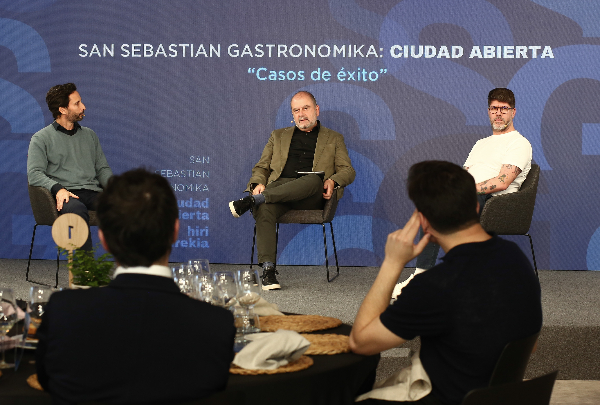
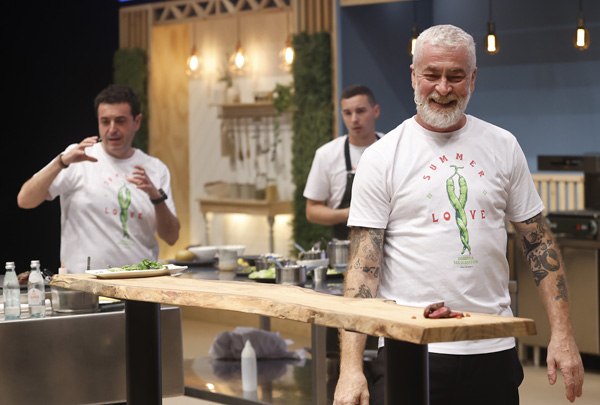
.jpg)
.jpg)
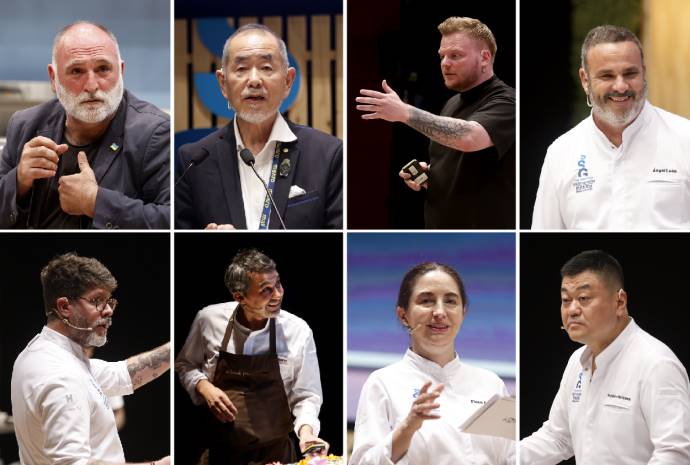
.jpg)
.jpg)

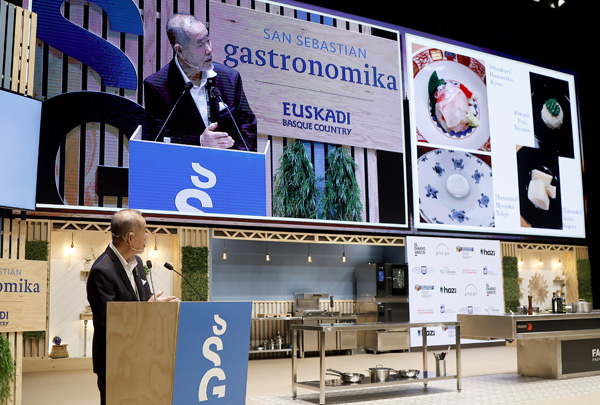
.jpg)







